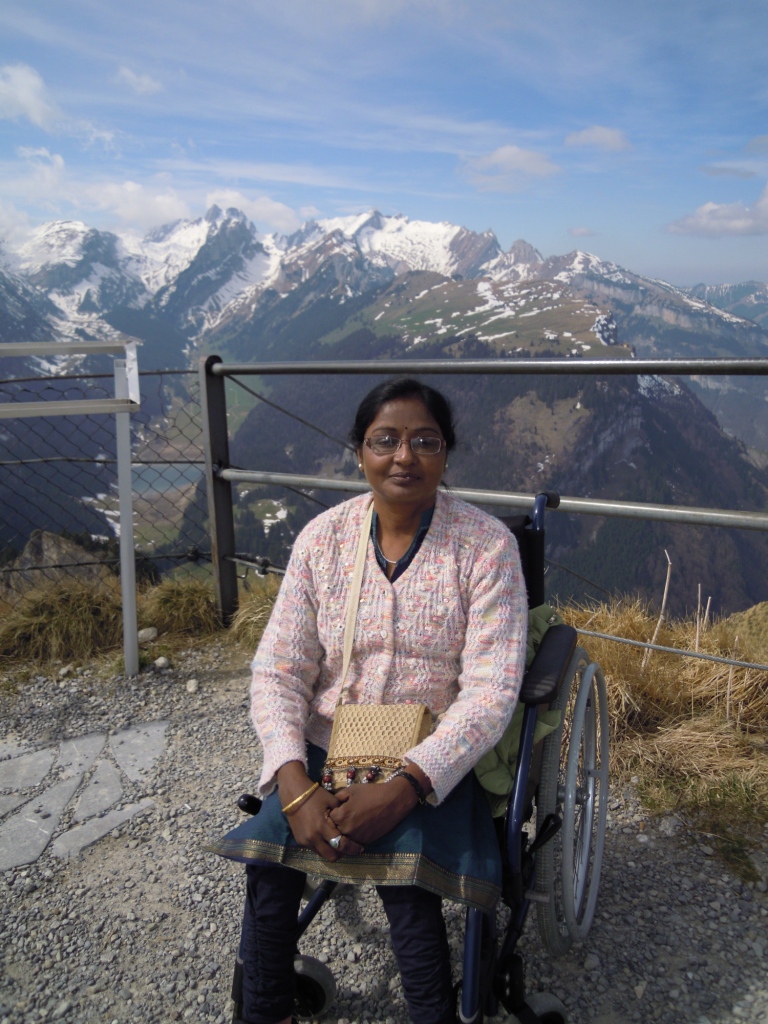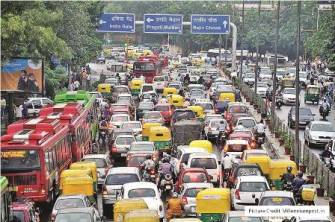
One Sunday a while back I was lazing in one of the soft, roomy, easy chairs in the flat I rent here in Delhi when my phone rang. It was Alamelu a friend who is an Assistant Professor at a college for women here in Delhi. She said she was nearby with her husband and asked could we meet up. It was an easy question and I was soon hurrying off to meet them at gate number two of Green Park Metro station.
Alamelu and her husband Annavaram are new friends, people I met last year at a conference especially called to review how much progress was being made in a movement called Engage Disability which is striving to improve the response of church in India to disability. They stood out at that conference because they walked everywhere hand in hand, then gradually it became apparent that they are a delightful couple with a love for the Lord who has touched their lives in rather special ways.
Annavaram and Alamelu are blind. She can see a little but Annavaram nothing at all, yet as a team holding hands, they are able to move around confidently even in an unknown conference venue. I was to meet them both again a few months later at an academic conference arranged by Annavaram in his role as an Assistant Professor at a leading central university. Now he was in Delhi for a visit and I was rushing off to bring them home.
We agreed to walk home from the station which proved to be a good lesson for me. I must have walked those gullies a thousand times but never before had I noticed how many obstacles there are if you cannot see. With a good deal of “keep left” and “look out for the bollard” and “be careful here the footpath becomes rubble” and at one point a quick bend to move a plastic bottle out of the way, we arrived home and I experienced the joy of introducing my new friends to the family with whom I live.
But really what I wanted to share was something of what we talked about and most especially something Annavaram told me had deeply affected his life as a boy.
Alamelu is happy to admit that if it were not for being visually impaired she would probably not have received any education at all. In the small village where she was born there was precious little money and usually girls would be married early without going to school because of the cost involved. A relative told her parents about a school in Chennai especially for girls who were blind and he took her and got her admitted. Alamelu is from Telugu speaking Chittor district in Andhra Pradesh so at first she struggled with Tamil but in the end she learned and would go on to become fluent in Tamil and English and able to read both in Braille. Perhaps she would not have become a Christian either but for her blindness, her family is Hindu but her special school was Christian and she grew up learning about the Lord and in recent times took baptism.
Annavaram’s story was a little different; he joined school late and when he started at a Christian-run special school for the blind and learned Braille his world opened up in the most marvellous way. He was just a boy but he was troubled with notions of God in an imperfect world and what on earth was the purpose for his life as a blind child. Between lobbying for better food for the hostel boys, Annavaram discovered the wonders of the Bible in Braille. And then he found John 9 and the story where the disciples asked Jesus who had sinned, the man born blind or his parents. Jesus replied that neither had sinned
“but this happened so that the works of God might be displayed in him.” John 9:3
Annavaram told us, that Jesus’ reply to the disciples was a reply to his own question about what the purpose of his life could be. It was immediately obvious that what is required of him is to use his life to give Glory to God.
Do you understand? It is not a fickle God who makes one to see and another to be blind, one to hear and another to be deaf, one to walk and run and dance and another to never be able to even stand. Each one of us is unique and each has a purpose to live life to His glory. Many of us will never hear that truth as clearly as Annavaram did and that is not a mistake, Annavaram was looking for answers and The Lord put scripture into his hands and a means to read it. In our times too Jesus speaks to each one of us, those with disabilities as much as to any other.
Alamelu and Annavaram are faithful Christians on their journey through life. He often preaches and both exhibited a depth of knowledge and love for scripture at sessions they shared at the Engage Disability conference. To watch Alamelu pass her hands gently across the pages of her Braille addition of the gospels and hear the reverence in her voice as she reads aloud is a miracle and a joy. I am so glad that they have both brought to me a fresh view of life and the wondrous work of God in his children.
Braille takes up a lot of space on the page so each book of the Bible is printed separately. Alamelu and Annavaram’s Braille Bibles were sent free of cost to them, book by book over a period of time, by Lutheran Braille Workers

 The atmosphere in Kiran Village*, Madhopur, near Varanasi is amazing. The formally barren landscape is covered with trees and purpose-built buildings and the little paths are busy with boys and girls and young men and women on crutches, with wheelchairs or just plain wobbly, making their way from the gate to their class-rooms, the production units or the therapy rooms. Just a half a mile down the road is the Ganga, flowing slowly and low at this time of the year and with broad, sandy banks.
The atmosphere in Kiran Village*, Madhopur, near Varanasi is amazing. The formally barren landscape is covered with trees and purpose-built buildings and the little paths are busy with boys and girls and young men and women on crutches, with wheelchairs or just plain wobbly, making their way from the gate to their class-rooms, the production units or the therapy rooms. Just a half a mile down the road is the Ganga, flowing slowly and low at this time of the year and with broad, sandy banks.
